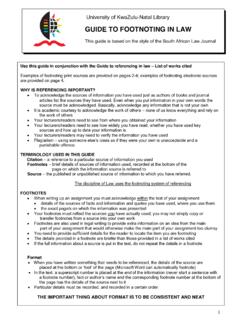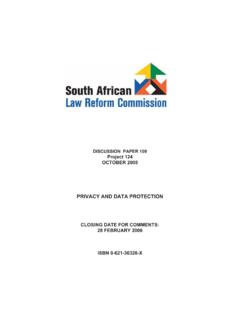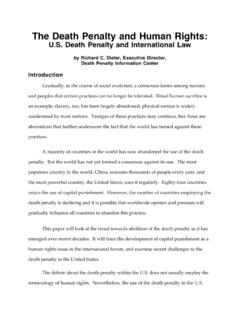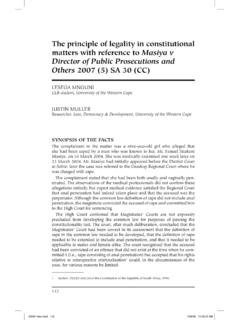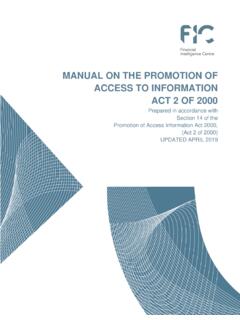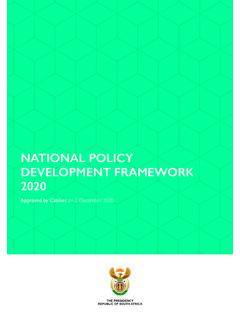Transcription of Competition Law and Policy in South Africa ... - OECD
1 Competition Law and Policy in South Africa South Africa aspires to a modern Competition Policy regime to support the Competition Law fundamental restructuration of government institutions. This report by the OECD and Policy in South Africa Secretariat which provides an overview of Competition law and Policy in South Africa was the basis of an in-depth peer review at the 2003 OECD Global Forum on Competition . Useful lessons were drawn from this first peer review of a developing country at this Forum, which gathered about 70 economies at all stages of economic development.. This review is part of the OECD's ongoing co-operation with non-member economies around the world. An OECD Peer Review This work is published under the auspices of the OECD's Centre for Co-operation with Non-Members (CCNM). The Centre promotes and co-ordinates the OECD's Policy dialogue and co-operation with economies outside the OECD area.
2 Free copies of this document can be obtained from the Competition Division of the OECD, e-mail: MAY 2003. Competition Law and Policy in South Africa AN OECD PEER REVIEW. ORGANISATION FOR ECONOMIC CO-OPERATION AND DEVELOPMENT. ORGANISATION FOR ECONOMIC CO-OPERATION. AND DEVELOPMENT. Pursuant to Article 1 of the Convention signed in Paris on 14th December 1960, and which came into force on 30th September 1961, the Organisation for Economic Co-operation and Development (OECD) shall promote policies designed: to achieve the highest sustainable economic growth and employment and a rising standard of living in member countries, while maintaining financial stability, and thus to contribute to the development of the world economy;. to contribute to sound economic expansion in member as well as non-member countries in the process of economic development; and to contribute to the expansion of world trade on a multilateral, non-discriminatory basis in accordance with international obligations.
3 The original member countries of the OECD are Austria, Belgium, Canada, Denmark, France, Germany, Greece, Iceland, Ireland, Italy, Luxembourg, the Netherlands, Norway, Portugal, Spain, Sweden, Switzerland, Turkey, the United Kingdom and the United States. The following countries became members subsequently through accession at the dates indicated hereafter: Japan (28th April 1964), Finland (28th January 1969), Australia (7th June 1971), New Zealand (29th May 1973), Mexico (18th May 1994), the Czech Republic (21st December 1995), Hungary (7th May 1996), Poland (22nd November 1996), Korea (12th December 1996) and the Slovak Republic (14h December 2000). The Commission of the European Communities takes part in the work of the OECD (Article 13 of the OECD. Convention). OECD CENTRE FOR CO-OPERATION WITH NON-MEMBERS. The OECD Centre for Co-operation with Non-members (CCNM) promotes and co-ordinates OECD's Policy dialogue and co-operation with economies outside the OECD area.
4 The OECD. currently maintains Policy co-operation with approximately 70 non-member economies. The essence of CCNM co-operative programmes with non-members is to make the rich and varied assets of the OECD available beyond its current membership to interested non-members. For example, the OECD's unique co-operative working methods that have been developed over many years; a stock of best practices across all areas of public Policy experiences among members; on-going Policy dialogue among senior representatives from capitals, reinforced by reciprocal peer pressure; and the capacity to address interdisciplinary issues. All of this is supported by a rich historical database and strong analytical capacity within the Secretariat. Likewise, member countries benefit from the exchange of experience with experts and officials from non-member economies. The CCNM's programmes cover the major Policy areas of OECD expertise that are of mutual interest to non-members.
5 These include: economic monitoring, statistics, structural adjustment through sectoral policies, trade Policy , international investment, financial sector reform, international taxation, environment, agriculture, labour market, education and social Policy , as well as innovation and technological Policy development Publi en fran ais sous le titre : Politique et droit de la concurrence en Afrique du Sud UN EXAMEN DE L'OCDE PAR LES PAIRS. OECD 2003. Permission to reproduce a portion of this work for non-commercial purposes or classroom use should be obtained through the Centre fran ais d'exploitation du droit de copie (CFC), 20, rue des Grands-Augustins, 75006 Paris, France, tel. (33-1) 44 07 47 70, fax (33-1) 46 34 67 19, for every country except the United States. In the United States permission should be obtained through the Copyright Clearance Center, Customer Service, (508)750-8400, 222 Rosewood Drive, Danvers, MA 01923 USA, or CCC Online: All other applications for permission to reproduce or translate all or part of this book should be made to OECD Publications, 2, rue Andr -Pascal, 75775 Paris Cedex 16, France.
6 FOREWORD. Foreword The OECD Centre for Co-operation with Non Members has promoted a mutually beneficial dialogue between OECD members and non-member economies. National Competition authorities from around the world, and some countries that do not yet have Competition authorities, meet at the OECD Global Forum on Competition (GFC), one of the Organisation's eight Global Forums. The GFC seeks to advance a range of objectives, including the promotion of global enforcement co-operation, effective law enforcement against international cartels, greater efficiency of merger review procedures, and the development of analysis and dissemination of its results. An increasingly common way to structure and focus the dialogue is through a peer review exercise, in which probing questions are asked and the responses lead to in-depth exploration of shared experiences and evolving common standards, or perhaps a greater understanding of important differences.
7 At the OECD, this process has become familiar, not only through the work of the Economic Development and Review Committee, but also, more recently, under the programme of regulatory reform reviews. The OECD's Competition Committee has held nearly 20 peer reviews that have examined Competition law and enforcement institutions of member countries as well as the Competition dimension of regulatory reform in sectors such as energy, transportation and telecommunications. Peer review processes also have attracted considerable interest in other contexts. For example, in 2002, a peer review mechanism was set up in connection with the New Partnership for Africa 's Development (NEPAD) initiative, as an opportunity for leaders to make a difference in governance through sharing experience and encouraging each other to improve their performance. Thus, it is particularly appropriate that the Republic of South Africa stepped forward to be the first country to undergo a peer review in the GFC.
8 The following report was the basis for a three-hour peer-review discussion at the GFC meeting in Paris on 11 February 2003. Some of the themes developed in this discussion illustrated unique features of the South african experience. Notably, South Africa 's constitutional transformation in 3. Competition LAW AND Policy IN South Africa : AN OECD PEER REVIEW. the 1990s gave high priority to the redressing of economic imbalances corresponding to racial divisions in this country, and a stronger Competition Policy was proposed as a tool to help in that process. Due to its history, South Africa has both a developing economy and a developed one. It was thus appropriate that South Africa be reviewed by peers from some 60 countries at all stages of economic development. In short, South Africa 's experience provides lessons for all. This first venture in peer review in the Global Forum context thus underscores the basic goal that members and non-members have much to offer each other in this dialogue.
9 Eric Burgeat Director Centre for Co-operation with Non-Members 4. TABLE OF CONTENTS. Table of Contents 7. Competition Policy 9. Context And History .. 9. Policy Goals .. 17. Substantive Issues: Content of the Competition Law .. 21. Horizontal Agreements .. 22. Vertical Agreements .. 24. Abuse of 24. Mergers .. 27. Institutional Issues: Enforcement Structures and Practices .. 37. Competition Policy Institutions .. 37. Competition Law Enforcement .. 40. International Trade Issues in Competition Policy and 46. Agency Resources, Actions, and Priorities .. 47. Limits of Competition Policy : Exemptions and Special Regulatory 51. Economy-Wide Exemptions or Special Treatments .. 51. Sector-Specific Exclusions, Rules and 53. Competition Advocacy and Policy 60. Assessment and Policy 63. Policy Options for 70. Notes .. 74. References .. 75. 5. SUMMARY. SUMMARY. One of the elements of South Africa 's peaceful revolution over the last decade was reform of its Competition Policy institutions.
10 The previous system had supported the previous economic system, characterised by autarky, protection, government direction, and high concentration. The new system promised to use Competition Policy to correct the faults of the old system and to promote Policy goals of employment and empowerment. South Africa aspires to a modern Competition Policy regime, to deal with the well-resourced sophistication of much of the South african economy. Its new institutions, whose novelty responds in large part to the post-1994. imperative for fundamental restructuring of government institutions, have shown a capacity to deal confidently with complex structural issues in deciding dozens of merger cases. A. legalistic business and government culture has challenged these new bodies to prove their competence and tested their jurisdiction. Now that the merger review process has been established, more attention should be paid to non-merger matters and probably to advocacy as well.










